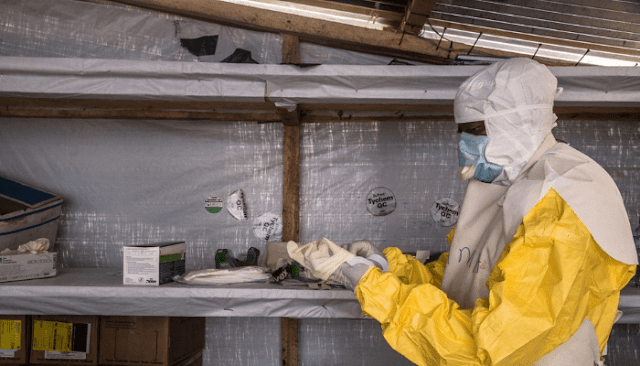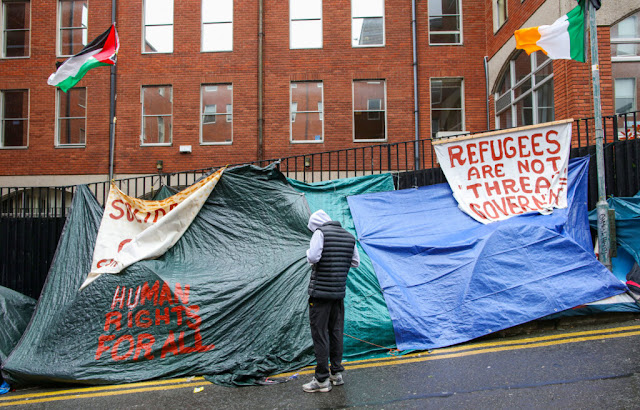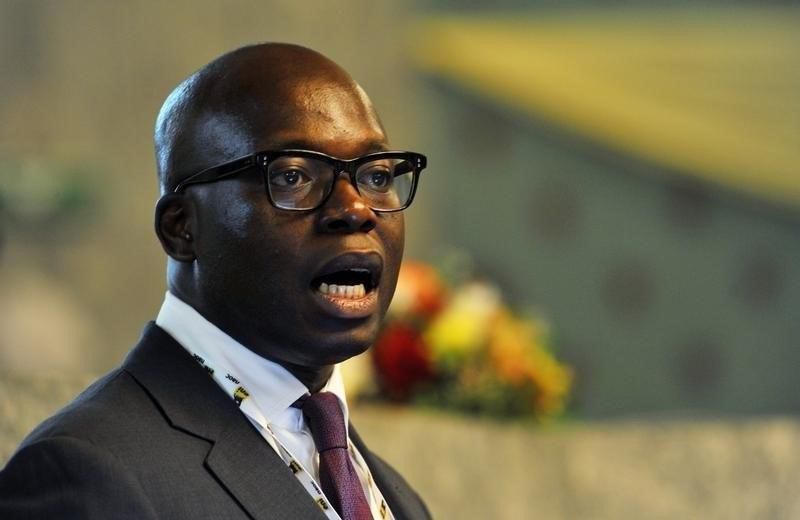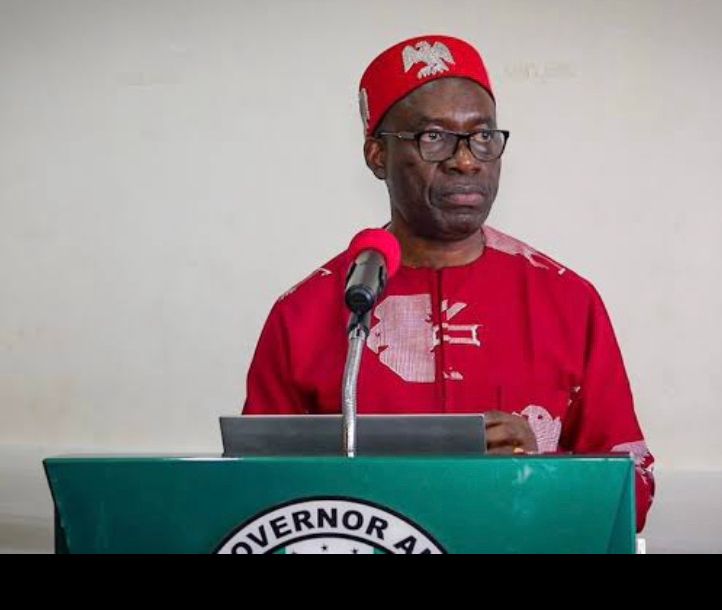The Federal Government of Nigeria has announced plans to intensify border control measures in response to growing concerns about a new Ebola virus outbreak in the region. This decision follows reports from the Democratic Republic of Congo (DRC), where health authorities confirmed a resurgence of the deadly Ebola virus disease (EVD) in the eastern part of the country. The Nigerian government, wary of the potential for cross-border transmission, is taking proactive steps to safeguard public health and prevent the spread of the disease into its territory. The announcement was made on September 5, 2025, by the Federal Ministry of Health, in collaboration with the Nigeria Centre for Disease Control and Prevention (NCDC).
The Ebola virus, notorious for its high mortality rate and rapid transmission in previous outbreaks, has once again raised alarm bells across Africa, prompting Nigeria to act swiftly to protect its population of over 200 million people. The new outbreak in the DRC, which shares no direct land borders with Nigeria, nonetheless poses a risk due to the interconnected nature of regional travel and trade. With Nigeria being a major hub for international and regional travel in West Africa, the government is leaving no stone unturned to ensure that the country remains free of the virus.
Background on the Ebola Virus and Regional Context
Ebola virus disease is a severe, often fatal illness caused by the Ebola virus, a member of the Filoviridae family. The virus is transmitted to humans from wild animals and spreads through human-to-human contact via bodily fluids, contaminated surfaces, or medical equipment. Symptoms include fever, severe headache, muscle pain, weakness, fatigue, diarrhea, vomiting, abdominal pain, and, in severe cases, internal and external bleeding. The disease has a case fatality rate ranging from 25% to 90%, depending on the strain and the quality of medical care available.
The DRC has been a recurring epicenter for Ebola outbreaks, with the latest flare-up reported in the North Kivu province. According to the World Health Organization (WHO), the new cases were detected in late August 2025, with at least 12 confirmed infections and six deaths reported by early September. The outbreak has raised concerns due to the region’s ongoing challenges, including conflict, population displacement, and limited healthcare infrastructure, all of which complicate containment efforts. The DRC’s history with Ebola, including the devastating 2018–2020 outbreak that claimed over 2,200 lives, underscores the urgency of addressing the disease promptly.
Nigeria’s concern is heightened by its experience with Ebola in 2014, when the virus was introduced into the country via an infected traveler from Liberia. The outbreak, though contained swiftly through robust public health measures, resulted in 20 confirmed cases and eight deaths, primarily in Lagos and Port Harcourt. The memory of that episode, coupled with the new outbreak in the DRC, has galvanized the Nigerian government to act decisively to prevent a repeat scenario.
Nigeria’s Border Control Measures
The Federal Ministry of Health, in coordination with the NCDC, has outlined a multi-pronged strategy to strengthen border surveillance and prevent the importation of Ebola into Nigeria. The measures include enhanced screening at all points of entry, increased deployment of health personnel, and the use of advanced diagnostic tools to detect potential cases. According to a statement from the NCDC, all international airports, seaports, and land borders will see heightened vigilance, with travelers from high-risk areas subjected to rigorous health checks.
At major international airports such as Murtala Muhammed International Airport in Lagos and Nnamdi Azikiwe International Airport in Abuja, thermal scanners and non-contact thermometers will be used to screen passengers for fever, a primary symptom of Ebola. Travelers will also be required to complete health declaration forms, providing details of their travel history and any potential exposure to Ebola-risk areas. Those arriving from the DRC or neighboring countries with reported cases will undergo secondary screening, which may include rapid diagnostic testing if symptoms are detected.
Land borders, which are often more challenging to monitor due to their porous nature, will see an increased presence of health officials and security personnel. Nigeria shares land borders with Benin, Niger, Chad, and Cameroon, and while none of these countries have reported Ebola cases in the current outbreak, the government is taking no chances. Mobile health units equipped with diagnostic kits will be deployed to key border crossings, and community health workers will be trained to identify and report suspected cases in border communities.
The Nigeria Immigration Service (NIS) has also been directed to enhance its monitoring of cross-border movements. Immigration officers will work closely with health officials to ensure that travelers entering Nigeria comply with health protocols. The government has also announced plans to collaborate with neighboring countries to share intelligence on the movement of people and goods, particularly in regions close to the DRC or other affected areas.
Public Health Preparedness and Response
Beyond border control, Nigeria is ramping up its public health preparedness to ensure a rapid response in the event of a confirmed case. The NCDC has activated its Emergency Operations Centre (EOC) at a low-level alert status, which allows for real-time monitoring of the situation in the DRC and coordination of response activities within Nigeria. The EOC will serve as the nerve center for information dissemination, resource allocation, and coordination with international partners such as the WHO and the Africa Centres for Disease Control and Prevention (Africa CDC).
The NCDC is also working to strengthen the capacity of healthcare facilities across the country to manage potential Ebola cases. Isolation centers, which were established during the 2014 outbreak, are being reactivated and equipped with necessary medical supplies, including personal protective equipment (PPE) for healthcare workers. Training programs for doctors, nurses, and laboratory technicians are being rolled out to ensure that frontline workers are well-prepared to handle suspected or confirmed cases safely.
Public awareness campaigns are another critical component of Nigeria’s response strategy. The Federal Ministry of Health, in collaboration with state governments and non-governmental organizations, is launching nationwide campaigns to educate the public about Ebola, its symptoms, and preventive measures. Radio jingles, television advertisements, and social media posts will be used to disseminate information in multiple languages, including English, Pidgin, Hausa, Yoruba, and Igbo, to reach Nigeria’s diverse population. Community leaders, religious institutions, and traditional rulers are also being engaged to promote hygiene practices, such as regular handwashing and avoiding contact with bodily fluids.
Lessons from the 2014 Ebola Outbreak
Nigeria’s response to the current Ebola threat is informed by its successful containment of the 2014 outbreak, which was widely praised as a model for effective public health intervention. The 2014 outbreak began when a Liberian-American traveler, Patrick Sawyer, arrived in Lagos with the virus, sparking fears of a widespread epidemic in one of Africa’s most populous cities. However, Nigeria’s swift response, led by the NCDC and the Lagos State Government, prevented a catastrophe.
Key to Nigeria’s success in 2014 was its robust contact-tracing system. Health officials meticulously tracked down and monitored over 800 individuals who had come into contact with infected persons, ensuring that the virus was contained within weeks. The use of technology, including mobile apps for real-time data collection, also played a crucial role. Additionally, the government’s transparent communication with the public helped to curb misinformation and panic, fostering trust in the response efforts.
The 2014 experience has left Nigeria with a strong public health infrastructure and a cadre of experienced professionals who are now being mobilized to address the current threat. The NCDC, established in 2011, has since grown into a formidable institution, with diagnostic laboratories, rapid response teams, and a network of state-level epidemiologists. The agency’s expertise was further honed during the COVID-19 pandemic, which tested Nigeria’s ability to manage a large-scale infectious disease outbreak.
Regional and International Collaboration
The Ebola threat underscores the importance of regional and international cooperation in combating infectious diseases. Nigeria is working closely with the WHO, Africa CDC, and other global health organizations to monitor the situation in the DRC and share best practices for containment. The WHO has deployed technical experts and medical supplies to the DRC to support case management and vaccination efforts, and Nigeria has expressed its readiness to contribute resources if needed.
The Africa CDC, based in Addis Ababa, Ethiopia, is also playing a pivotal role in coordinating the regional response. The agency has called for increased surveillance across African countries and is providing technical support to strengthen laboratory capacity and data sharing. Nigeria, as a key member of the African Union, is actively participating in these efforts and has pledged to support regional initiatives to curb the spread of Ebola.
At the international level, Nigeria is engaging with organizations such as Médecins Sans Frontières (Doctors Without Borders) and the United States Centers for Disease Control and Prevention (CDC) to access expertise and resources. The development of Ebola vaccines, such as the rVSV-ZEBOV vaccine, which proved effective during the 2018–2020 DRC outbreak, has given hope for controlling the current outbreak. Nigeria is exploring options to procure and stockpile vaccines as a precautionary measure, although no cases have been reported in the country.
Challenges and Risks
Despite Nigeria’s proactive measures, several challenges could hinder its efforts to prevent an Ebola outbreak. The country’s porous borders, particularly in the northern and eastern regions, are difficult to monitor due to informal trade routes and cross-border migration. Smuggling activities and undocumented movements of people could facilitate the unnoticed entry of the virus.
Additionally, Nigeria’s healthcare system, while improved since 2014, still faces challenges such as underfunding, inadequate infrastructure in rural areas, and a shortage of trained healthcare workers. The high population density in urban centers like Lagos, Kano, and Abuja increases the risk of rapid transmission if the virus were to enter the country. Misinformation and stigma surrounding Ebola could also complicate public health efforts, as seen in previous outbreaks where communities resisted interventions due to fear or mistrust.
The ongoing insecurity in parts of Nigeria, particularly in the northeast where Boko Haram and other insurgent groups remain active, could further complicate response efforts. Conflict zones often have limited access to healthcare, making it difficult to implement surveillance and containment measures. The government has acknowledged these challenges and is working to address them through partnerships with security agencies and humanitarian organizations.
The Way Forward
As Nigeria braces for the potential threat of Ebola, the government is emphasizing a whole-of-society approach to preparedness. This includes engaging the private sector, civil society, and international partners to ensure a coordinated and effective response. The Federal Ministry of Health has called on all Nigerians to remain vigilant and report any suspected cases to the nearest health facility or the NCDC toll-free hotline.
The government is also investing in research and innovation to strengthen its capacity to respond to infectious diseases. The NCDC is collaborating with local universities and research institutions to develop diagnostic tools and treatment protocols tailored to Nigeria’s context. The lessons learned from managing Ebola, COVID-19, and other outbreaks are being documented to build a repository of knowledge that can guide future responses.
Public health experts have commended Nigeria’s proactive stance but caution that sustained vigilance is essential. Dr. Chikwe Ihekweazu, former Director-General of the NCDC and current WHO official, emphasized the importance of early detection and rapid response in controlling Ebola. “Nigeria’s experience in 2014 showed the world that a well-coordinated response can stop Ebola in its tracks. The country must maintain that momentum and ensure that no gaps are left in its defenses,” he said in a recent interview.
Conclusion
The Federal Government of Nigeria’s decision to tighten border control in response to the new Ebola outbreak in the DRC reflects its commitment to protecting public health and preventing a repeat of the 2014 crisis. By enhancing surveillance, strengthening healthcare infrastructure, and engaging in regional and international cooperation, Nigeria is positioning itself to effectively manage the threat. However, the success of these measures will depend on sustained funding, public cooperation, and the ability to address systemic challenges in the healthcare system.
As the situation in the DRC evolves, Nigeria remains on high alert, ready to act swiftly to safeguard its population. The country’s proactive approach serves as a reminder of the importance of preparedness in the face of infectious diseases, particularly in a region where health threats can spread rapidly across borders. For now, Nigerians are urged to stay informed, practice good hygiene, and support the government’s efforts to keep Ebola at bay.







